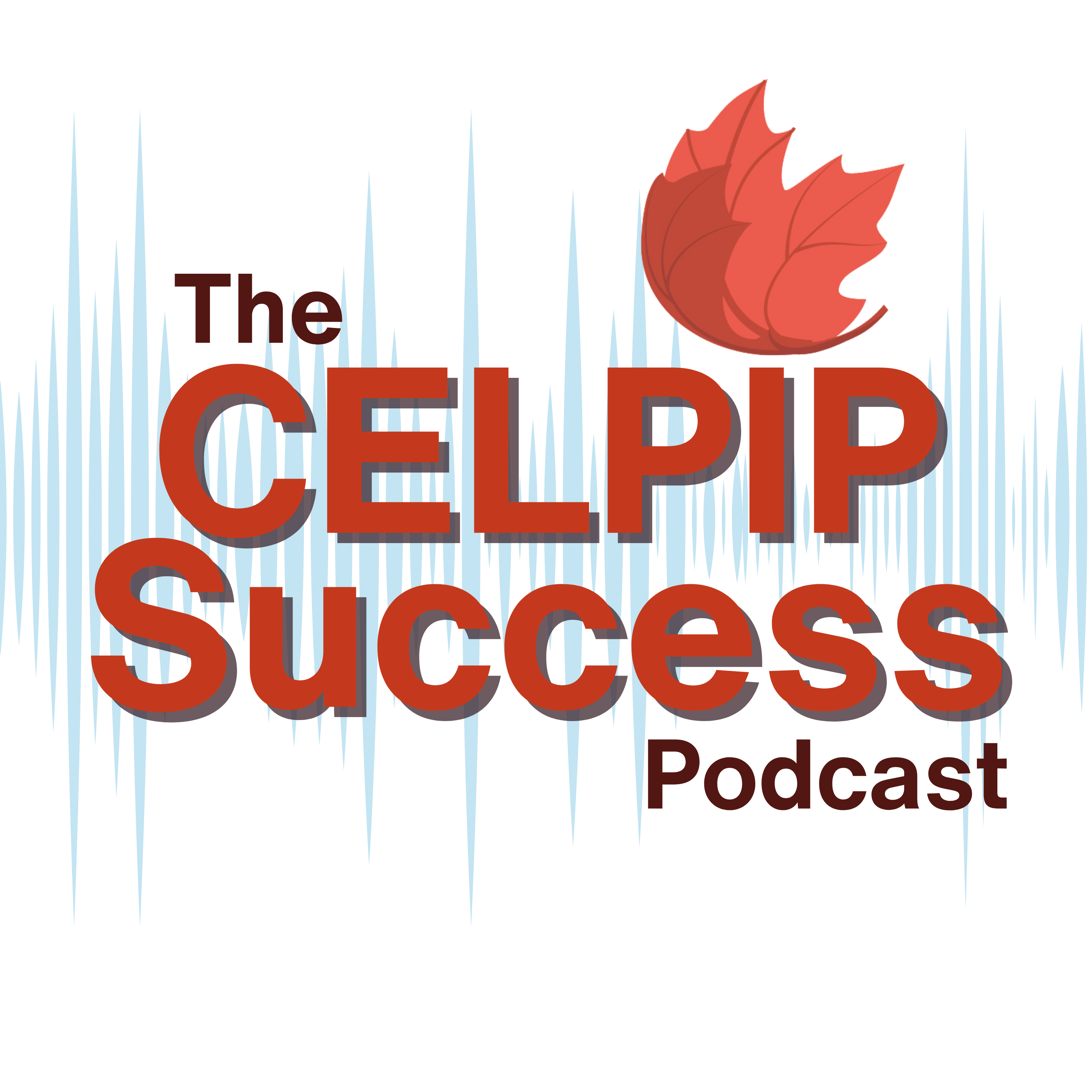Episode 85
How to Improve Your Brainstorming Skills for the CELPIP
Struggling with brainstorming ideas for the CELPIP exam is a common challenge faced by many test takers. This episode addresses the importance of recognizing that you already have the ability to think quickly and respond in conversations, even if it feels daunting in an exam setting.
I'll highlight practical strategies to help you improve your brainstorming skills, such as keeping a journal to boost creativity and vocabulary.
Engaging in new experiences and conversations with native English speakers can also help you adapt to thinking on your feet. By embracing these techniques, you can improve your quick thinking abilities and feel more confident during the CELPIP exam.
Takeaways:
- Many test takers struggle with brainstorming during the CELPIP exam, so you're not alone.
- The pressure of the CELPIP exam can lead to overthinking, making it harder to brainstorm.
- Writing by hand improves memory and creativity, which can help brainstorming skills.
- Engaging in spontaneous conversations with native speakers can enhance quick thinking abilities.
- Regularly putting yourself in new situations can boost your creative thinking skills.
- Keeping a journal can be a practical way to develop creativity and language skills.
Links Mentioned Today
Why Writing By Hand Beats Typing For Thinking and Learning (NPR.org)
Other links of interest:
Three ways that handwriting with a pen positively affects your brain. (Forbes.com)
Why writing by hand is better for your brain. (Psychology Today)
Transcript
Have you ever found yourself struggling with how to come up with ideas quickly about what you should talk or write about on the CELPIP exam?
You know when the question appears before you and then the timer automatically begins ticking away, and you know you have to come up with something to say or something to write, but you're not sure what? This week I'm going to be answering another question from one of my listeners, and it's a vote. You guessed it.
Brainstorming here's what Ina I struggle with brainstorming in speaking. I feel like I am overthinking this exam way too much than I'm supposed to, and it's starting to affect me when I'm trying to speak. Please help.
Well, hello there and welcome to the Speak English Fearlessly Podcast.
This is the podcast from motivated English learners who want to speak English fearlessly and learn practical tips and strategies to conquer the selfif exam.
I also love to feature encouraging interviews with regular people, people just like you, who are working towards becoming fluent in English so we can learn from their experiences together. Who am I? My name is Aaron Nelson.
I'm a certified CELPIP trainer and I've been an English teacher for over 17 years, and I now help students prepare for the CELPIP exam through online classes. Ina first of all, thank you for writing. I'll begin by letting you know that many test takers struggle with brainstorming. So you're not alone.
And it's important that you know that so that you're not tempted to believe that you're the only one who struggles with this skill. You're not. And you mentioned something interesting in your question that you felt like you were overthinking the exam way too much.
You know, I think brainstorming is one of those things that people tend to overthink as well, simply because it's something you're given time to do.
The CELPIP exam, because it's part of what you get to do during the exam, and because the exam is of vital importance to you and your immigration process, it's only natural to attach a level of meaning and complexity to brainstorming that it doesn't need to have. In short, we make it harder than what it needs to be.
In reality, though, we brainstorm or think about what to say before we say it most of the time on a daily basis.
And actually the amount of time we give ourselves to think about what to say before we say it is mere seconds, not nearly as long as you get on the exam. Have you ever thought about that before? You already know how to think quickly before you speak, and you do it much faster in real life situations.
You don't believe me? Well, when was the last time you needed to talk with someone in English for more than a minute or two?
Did you know beforehand what they were going to talk with you about? Or was it totally random? My guess is that the majority of the time the topic of conversation is quite random.
And when it was your turn to speak, did you get a chance to think for like 30 seconds before you replied? Probably not, right? You likely just thought about what to say for a split second or two and then you just gave your response. We do this all the time.
So that's my first offering for you. If you struggle with brainstorming on the celpip, remind yourself that you already know how to do this. You do it already on a day by day basis.
But I do have a few ideas that will help you to develop your creative thinking skills. The first one is to keep a journal. Now I know what you're thinking.
You're probably thinking, well, what does keeping a journal have to do with me improving my brainstorming skills? And besides, I hate journaling and I don't have time to do it anyway.
Well, it might seem like journal writing won't help you build your creative thinking skills, but in reality it does. And actually, it can help you with a bunch more than just that.
According to many studies and articles, and I'll link to a few in my show notes today, writing not only helps you develop your creativity, but it can also help you build your vocabulary skills and improve your ability to use the language you're writing in. And best of all, according to one article from Forbes.com the more you write, the better you become at it. So why does writing help anyway?
According to an article over on npr.org and I quote, writing by hand improves memory and the recall of words. End quote. So in other words, writing by hand handwriting improves your memory and it also helps you to remember words.
Which is great if you're working on developing your vocabulary skills in English.
But writing helps our brains because of the complex movements our fingers need to make as we hold our pen or our pencil and move it along on the paper to create letters. And by the way, that NPR article that I just mentioned has a fabulous description of how this works.
It's so interesting to see the difference between handwriting and typing, for example, and how important and helpful this process of handwriting is to helping you develop your language skills. I encourage you to read it.
I think if you're like me, you'll be surprised at just how interesting it actually is when you think about the complexity of holding a pen and creating letters with it on paper. I never thought about it before in that way and I just thought it was quite amazing and I wanted to share it with you.
So that's not the only thing that it does for you. Handwriting is great for developing your memory.
It's also great for building your vocabulary skills, but it's also something that many authors totally rely on to help them as they're writing, and this article also points out that fact. Many well known authors rely on handwriting because of how much it boosts or increases their creativity. So that's my first idea for you.
If you're needing to develop your quick thinking and creativity skills for brainstorming, try the slow art of writing a little each day.
And that could be as simple as trying to keep a gratitude journal, for example, where you write about your day for five or 10 minutes before you go to sleep each night as a way for you to practice. But try writing a little each day and watch how that improves your creativity skills.
My second idea for you is to regularly put yourself into new or different situations. Break your routines the other day at work I needed to drive across town to one of our other locations. I've been to this location countless times.
In fact, I used to work there, so I know my way around there like the back of my hand. But guess what I discovered last week?
There's a bunch of construction going on and the main streets that lead to where I needed to go were all closed and we needed to take a detour. The detour ran through a whole other area of the neighborhood that I had never been to before and I had a rough idea of where I needed to end up.
But now I needed to get there from a completely different route. The result? I was instantly alert to every single detail around me. I could feel my senses suddenly alive as I drove through these unknown parts.
My brain was busily creating a brand new map of how to get to where I was going, and I needed to use creative thinking to find my way around all the closed off streets to get where I needed to go. And the same can happen for you, my friend. Look for ways to be putting yourself into unusual or unexpected situations.
This could be as simple as joining in conversations with native English speakers that you normally wouldn't.
In fact, I think that this is one of the best things that you can do for yourself if you need to improve your ability to think quickly about what to say next, be putting yourself into situations where you have to do this the first few times will feel scary, but I promise you this, the more you do it, the better you will become at thinking quickly. So, to summarize, to improve your brainstorming skills for the celpip, I encourage you to remember that you're already good at it.
You just might not have noticed that you are. You do this every day when you are talking with another person. You have to think quickly.
Second, pick up journaling, because writing your ideas by hand is good for your brain and your creativity.
And finally, make sure that you're always connecting with native English speakers for conversation so that you can practice engaging in the random topics of conversation that always come up. I hope that helps you develop your quick thinking skills this week. And thank you for listening.



